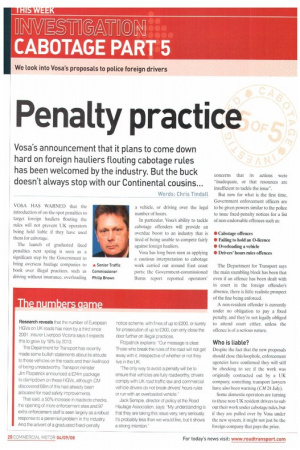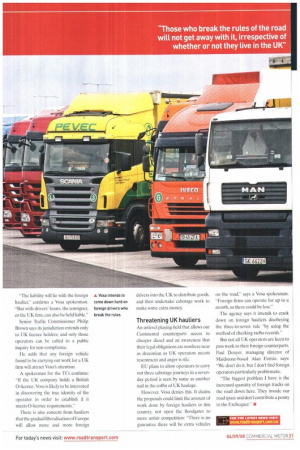Penalty practice
Page 20

Page 21

If you've noticed an error in this article please click here to report it so we can fix it.
Vosa's announcement that it plans to come down hard on foreign hauliers flouting cabotage rules has been welcomed by the industry. But the buck doesn't always stop with our Continental cousins...
Words: Chris Tindall
VOSA HAS WARNED that the introduction of on-the-spot penalties to target foreign hauliers flouting the rules will not prevent UK operators being held liable if they have used them for cabotage.
The launch of graduated fixed penalties next spring is seen as a significant step by the Government to bring overseas haulage companies to book over illegal practices, such as driving without insurance, overloading a vehicle, or driving over the legal number of hours.
In particular, Vosa's ability to tackle cabotage offenders will provide an overdue boost to an industry that is tired of being unable to compete fairly against foreign hauliers.
Vosa has long been seen as applying a cautious interpretation to cabotage work carried out around East coast ports: the Government-commissioned Bums report reported operators' concerns that its actions were "inadequate, or that resources are insufficient to tackle the issue".
But now for what is the first time, Government enforcement officers are to be given powers similar to the police to issue fixed-penalty notices for a list of non-endorsable offences such as: The Department for Transport says the main stumbling block has been that even if an offence has been dealt with in court in the foreign offender's absence, there is little realistic prospect of the fine being enforced.
A non-resident offender is currently under no obligation to pay a fixed penalty, and they're not legally obliged to attend court either, unless the offence is of a serious nature.
Who is liable?
Despite the fact that the new proposals should close this loophole, enforcement agencies have confirmed they will still be checking to see if the work was originally contracted out by a UK company, something transport lawyers have also been warning (CM 24 July).
Some domestic operators are turning to these non-UK resident drivers to sub out their work under cabotage rules, but if they are pulled over by Vosa under the new system, it might not just be the foreign company that pays the price. "The liability will lie with the foreign haulier," confirms a Vosa spokesman. -But with drivers' hours, the consigner, or the UK firm, can also be held liable."
Senior Traffic Commissioner Philip Brown says its jurisdiction extends only to UK licence holders, and only those operators can be called to a public inquiry for non-compliance.
He adds that any foreign vehicle found to be carrying out work for a UK firm will attract Vosa's attention.
A spokesman for the TCs confirms: "If the UK company holds a British 0-licence, Vosa is likely to be interested in discovering the true identity of the operator in order to establish if it meets 0-licence requirements."
There is also concern from hauliers that the gradual liberalisation of Europe will allow more and more foreign drivers into the UK to distribute goods, and then undertake cabotage work to make some extra money.
Threatening UK hauliers
An unlevel playing held that allows our Continental counterparts access to cheaper diesel and an awareness that their legal obligations are nowhere near as draconian as UK operators means resentment and anger is rife.
EU plans to allow operators to carry out three cabotage journeys in a sevenday period is seen by some as another nail in the coffin of UK haulage.
However, Vosa denies this. It claims the proposals could limit the amount of work done by foreign hauliers in this country. not open the floodgates to more unfair competition: "There is no guarantee there will be extra vehicles on the toad," says a Vosa spokesman. "Foreign firms can operate for up to a month, so there could be less."
The agency says it intends to crack down on foreign hauliers disobeying the three-in-seven rule "by using the method of checking tacho records."
But not all UK operators are keen to pass work to their foreign counterparts. Paul Denyer. managing director of Maidstone-based Alan Firmin, says: "We don't do it. but I don't find foreign operators particularly problematic.
"The biggest problem I have is the increased quantity of foreign trucks on the road down here. They invade our road space and don't contribute a penny to the Exchequer." •




































































































































































